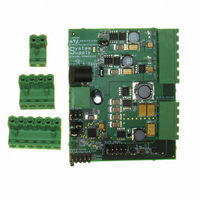STEVAL-PSQ001V1 STMicroelectronics, STEVAL-PSQ001V1 Datasheet - Page 42

STEVAL-PSQ001V1
Manufacturer Part Number
STEVAL-PSQ001V1
Description
BOARD EVAL BASED ON PM6680A
Manufacturer
STMicroelectronics
Type
Other Power Managementr
Specifications of STEVAL-PSQ001V1
Design Resources
STEVAL-PSQ001V1 Gerber Files STEVAL-PSQ001V1 Schematic STEVAL-PSQ001V1 Bill of Material
Main Purpose
DC/DC, Step Down with LDO
Outputs And Type
6, Non-Isolated
Voltage - Output
0.9 ~ 2.5 V, 1 ~ 3.3 V, 2x 3.3 V, 2.5 V, 5 V
Current - Output
4A, 2A, 800mA, 400mA, 400mA, 150mA
Voltage - Input
5 ~ 36V
Regulator Topology
Buck
Frequency - Switching
200kHz, 300kHz
Board Type
Fully Populated
Utilized Ic / Part
PM6680A
Input Voltage
5 V to 36 V
Output Voltage
1 V to 3.3 V
Product
Power Management Modules
Silicon Manufacturer
ST Micro
Silicon Core Number
PM6680A
Kit Application Type
Power Management
Application Sub Type
Power Supply
Kit Contents
Board
Rohs Compliant
Yes
Lead Free Status / RoHS Status
Lead free / RoHS Compliant
Power - Output
-
Lead Free Status / Rohs Status
Lead free / RoHS Compliant
For Use With/related Products
PM6680A
Other names
497-6425
STEVAL-PSQ001V1
STEVAL-PSQ001V1
Design guidelines
42/48
Equation 41
5.
6.
7.
8.
9.
●
●
●
●
(Let's assume Tmax=75 °C in R
R
Input capacitor
Maximum input capacitor RMS current is about 1.084 A. Then I
We put two 10 µF ceramic capacitors with Irms = 1.5 A.
Synchronous rectifier
OUT1: Shottky diode STPS1L40M
OUT2: Shottky diode STPS1L40M
Integrator loop
(Refer to figure 14)
OUT1: The ripple is smaller than 40 mV, then the virtual ESR network is required.
C
OUT2: The ripple is smaller than 40 mV, then the virtual ESR network is required.
C
Output feedback divider
(Refer to figure 6)
OUT1: R1 = 10 kΩ; R2 = 27 kΩ
OUT2: R1 = 10 kΩ; R2 = 10 kΩ
Layout guidelines
The layout is very important in terms of efficiency, stability and noise of the system. It is
possible to refer to the PM6680A demoboard for a complete layout example.
For good PC board layout follows these guidelines:
Place on the top side all the power components (inductors, input and output capacitors,
MOSFETs and diodes). Refer them to a power ground plan, PGND. If possible, reserve
a layer to PGND plan. The PGND plan is the same for both the switching sections.
AC current paths layout is very critical (see
their length. Trace the LS MOSFET connection to PGND plan as short as possible.
Place the synchronous diode D near the LS MOSFET. Connect the LS MOSFET drain
to the switching node with a short trace.
Place input capacitors near HS MOSFET drain. It is recommended to use the same
input voltage plan for both the switching sections, in order to put together all input
capacitors.
Place all the sensitive analog signals (feedbacks, voltage reference, current sense
paths) on the bottom side of the board or in an inner layer. Isolate them from the power
top side with a signal ground layer, SGND. Connect the SGND and PGND plans only in
one point (a multiple vias connection is preferable to a 0 ohm resistor connection) near
the PGND device pin. Place the device on the top or on the bottom size and connect
the exposed pad and the SGND pins to the SGND plan (see
CSENSE
INT
INT
= 1.5 nF; C
=1.5 nF; C
= 560 Ω.
filt
filt
=47 pF; R
= 47 pF; R
INT
INT
= 820 Ω
DSon
= 1.1 kΩ
calculation). We choose standard value
Figure 41
). The first priority is to minimize
Figure 41
CINRMS
).
> 1.084 A
PM6680A
















